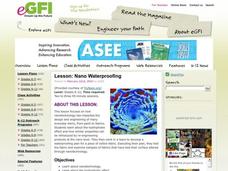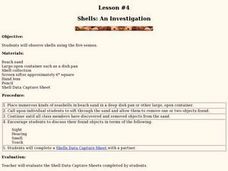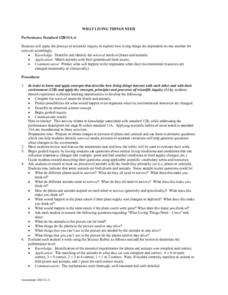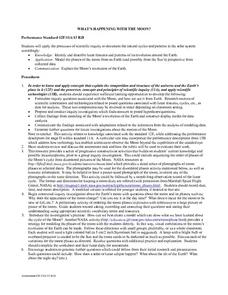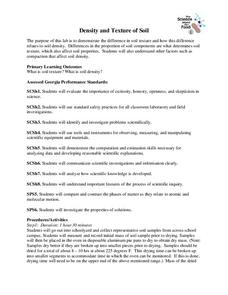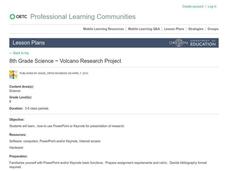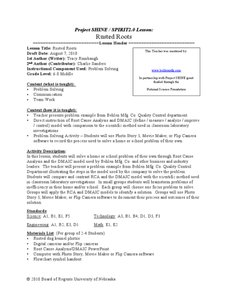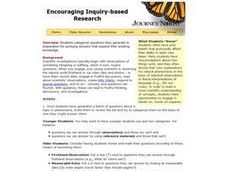Curated OER
Nano Waterproofing
Learners experiment to determine a way to waterproof a piece of cotton fabric. In this scientific inquiry lesson, students use reference worksheets to explore waterproofing and the use of nanotechnology in engineering everyday objects.....
Curated OER
You Can Die Here – Death Valley California
Students use Google Maps to explore the rain shadow desert. In this climate lesson, students use the Internet, Google Maps, and directed inquiry worksheets to understand how rain shadow deserts form. Students apply climate concepts to...
Curated OER
Shells: An Investigation
Students observe shells using their five senses. In this scientific inquiry lesson, students examine shells using a hand lens and their five senses. Students complete an included shell data sheet.
Curated OER
Design a Tornado-Proof Building
Students design a tornado-proof building. For this inquiry-based lesson, students demonstrate their knowledge of tornadoes and the damage they can cause by trying to design a building that can withstand a tornado.
Curated OER
Cell Division: Frog Egg Division Observation and Modeling
Students create and test a hypothesis about cell division. After observation of Frog Egg cell division, students write obervations and refine process and hypothesis. The use of scientific method, group work and inquiry are fostered by...
Curated OER
What Living Things Need
Students apply the process of scientific inquiry to explore how living things are dependent on one another for survival. They match animals with their generalized food source. Students predict what happens to the organisms when their...
Curated OER
What Do Parts Do?
Students review the components of the scientific inquiry method. In groups, they identify and describe the components and functions of all of the parts of a plant. Using a diagram, they label the parts of the plant chosen and share...
Curated OER
What's Happening With the Moon?
Young scholars review the process of scientific inquiry. Using this information, they identify the patterns and cycles of the moon as it revolves around the Earth. In groups, they model the phases of the moon from the Earth and Sun's...
Curated OER
Dude, Who Hit My Car?
Students discuss how investigators solve a hit and run accident. For this physical science lesson, students recreate an accident scene using CEENBot. They collect data from the experiment and formulate conclusion.
Curated OER
Survival in the Land of Batzilla
Young scholars experience a guided inquiry into the workings of an ultrasonic motion detector. They are led to study something they cannot see, hear, feel or taste. Students design strategies to avoid becoming prey of the predatory...
Scholastic
Study Jams! Scientific Methods
Middle school scientists learn the steps of the scientific method by watching this phenomenal film and by singing a karaoke song! They are introduced to making observations and hypotheses, determining variables, data collection, and...
Great Books Foundation
Discussion Guide for Handmaid's Tale
Great literature discussions are a consequence of carefully crafted questions, interpretative questions that permit more than one response, and responses supported by specific evidence from the text. The discussion questions in a guide...
Curated OER
Mercury in the Environment
Students develop abilities necessary to do scientific inquiry. They develop an understanding of chemical reactions, structures and properties of matter. They develop decision-making skills in natural and human-induced hazards.
Curated OER
Inquiring Minds
Young scholars demonstrate understanding of the scientific inquiry. They identify the major components of the scientific process.
Curated OER
The UPS Experiment
Students calculate the speed using metric measurements. In this geometry lesson, students calculate speed, distance and velocity using metric measurements. They gain inquiry and problem solving skills in this assignment.
University of Georgia
Antacid and Uncle Heartburn
Household materials can be used for more than cleaning! In this collaborative experiment, emerging chemists use products such as vinegar and liquid antacid to explore chemical reactions that commonly occur in the human body.
University of Georgia
Splat!
What does viscosity have to do with splatter? An activity shows that the viscosity of a substance is inversely proportional to the distance of its splatter. Learners conduct the experiment by collecting data, graphing, and analyzing the...
Curated OER
Scientific Tools
Students list different uses for common scientific instruments. They identify appropriate instruments to measure length, temperature, and mass. Pupils are given a copy of the "Science Tools" task sheet, students place the correct number...
University of Georgia
Density and Texture of Soil
All soil is not created equal! A lab activity asks learners to collect and analyze soil. Specific calculations determine the amount of sand, silt, and clay in a sample and allow individuals to identify the soil texture.
Curated OER
By Golly By Gum
Students identify the different steps in the scientific method. In this inquiry instructional activity, students determine the mass of the gum after chewing it for sometime. They explain what happens to the lost mass.
Curated OER
Volcano Research Project
Eighth graders research about different types of volcanoes. In this earth science lesson, 8th graders create PowerPoint presentation on the information gathered. They share findings with the class.
Curated OER
Rusted Roots
Students create a flowchart on the root cause method. In this inquiry lesson, students compare RCA and the DMAIC model with the scientific method of problem solving. They investigate a problem in school and present their findings in class.
Curated OER
Encouraging Inquiry-Based Research
Learners categorize questions they generate in preparation for pursuing answers that expand their existing knowledge. They create KWL charts and respond to journal questions to enable them to inquire to their fullest capacity.
Curated OER
Solids/Liquids - Inquiry Lesson
First graders explore the characteristics of solids and liquids. In groups, they generate ideas on how a solid is transformed to a liquid and back to a solid. They make predictions on how the process can be speeded up with a partner. ...
Other popular searches
- Life Science Inquiry
- Earth Science Inquiry
- Science Inquiry
- Science Inquiry Lessons
- Inquiry Based Science Lessons
- Inquiry Based Science Lesson
- Earth Science Inquiry Rocks
- Nature of Science Inquiry
- Earth Science Inquiry Water
- Life Science Inquiry Fossils
- Earth Science Inquiry Maps
- Life Science Inquiry Frogs


